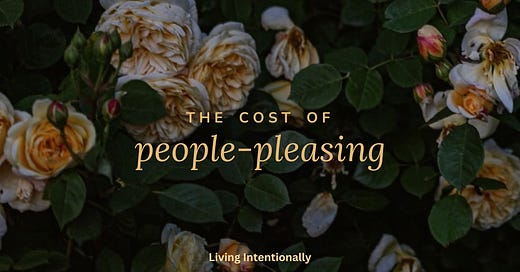People-pleasing might sound like a positive concept - generous, even - but when we talk about people-pleasing, we are talking about a self-sacrificial trait that has a poisonous sting in its tail.
“People-pleasers displease themselves to please others” (Jay Shetty), it is “the moment that you give up what matters to you in order to appease somebody else so that you can belong” (Dr Neha Sangwan).
It can show up at work, at home, in relationships, and it comes at a great cost.
Personal cost
Identity. People-pleasers have lost their sense of self. They have become so adept at blending in to fit in, they’re not sure of their own wants, needs, and beliefs. At worst, this can come across as divisive or manipulative, but generally it is more a feeling of inauthenticity. This diminished sense of self comes from a deep desire to be liked and to belong, but it can have the opposite effect.
Can you think of a time you’ve pretended to like something you don’t actually like, or haven’t even tried?
Emotional cost
Resentment. By putting their needs to one side, or even not acknowledging their existence at all, people-pleasers can experience feelings of resentment towards others. Noticing the feeling of resentment can be a major indicator that personal boundaries are being crossed.
Can you meet your own needs, before expecting others to? Do you know what they are? Find out by trying this challenge: A Week of Pleasing Myself.
Financial cost
Overspending. For people-pleasers, it might feel easier to pay out than put up any form of resistance. Perhaps they pay for more than their share on the bill because it’s easier to do that than have the uncomfortable conversation about how to split it, or be at risk of being unpopular in any way.
Have you ever financially overstretched to avoid conflict (or perceived conflict)?
Physical cost
Stress. 80% of illnesses are either caused or made worse by stress. An inherent inability to communicate ones needs, or sit with discomfort, can literally cost your health. Illness, overwhelm, anxiety, depression. All very real conditions, and often they can be reduced or healed by looking after oneself with care and attention.
Do you know how to self-regulate when you are feeling stressed, depressed or anxious?
Relationships
Avoidance. People-pleasers ignore tough conversations for fear of rocking the boat. They hold too much inside until they burst, often shocking those around them who may have had no clue anything was awry.
Can you remember a time where conflict felt sudden and out of the blue, more like an eruption?
Being able to tolerate discomfort, acknowledge your own needs, and stand up for your boundaries is critically important for your health and wellbeing. Doing so doesn’t need to be confrontational and shouldn’t spoil friendships or relationships, if anything it will strengthen and purify the connections you do have.
As Oscar Wilde put it so beautifully:
Be yourself; everybody else is already taken





The cost is typically self-erasure.